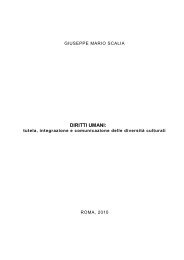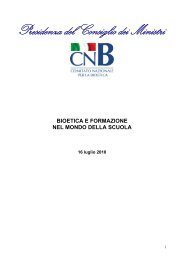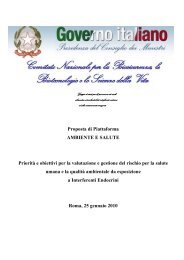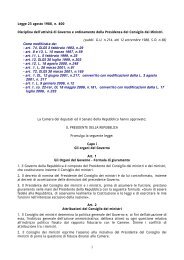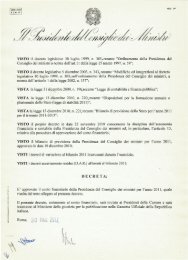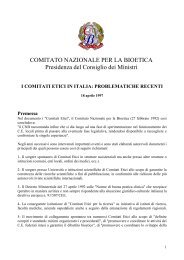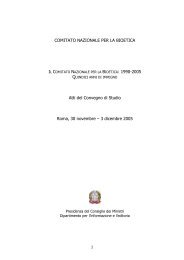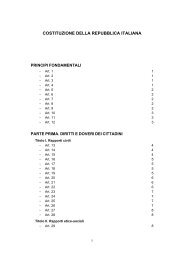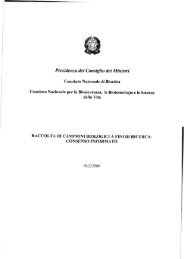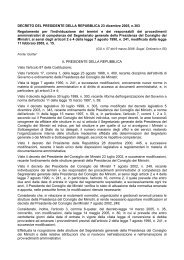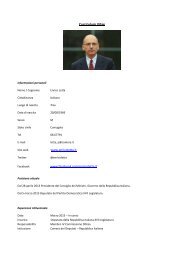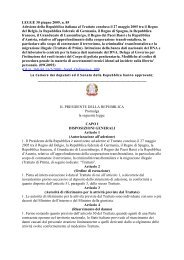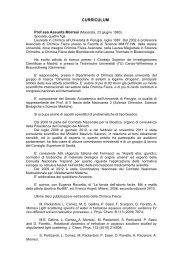President
President
President
You also want an ePaper? Increase the reach of your titles
YUMPU automatically turns print PDFs into web optimized ePapers that Google loves.
values inherent to fair play against all those external pressures that can translate<br />
in attacks against the essence of sport. And – as often happens for indeterminate<br />
concepts, which are easier to define negatively – the Council of Europe<br />
synthesises in the following terms those behaviours that are contrary to fair play<br />
and the external pressures that can have the effect of giving them a boost:<br />
cheating, tricks at the limit of legality (gamesmanship), doping, violence (physical<br />
and verbal), exploitation, inequality of opportunity, excessive commercialisation,<br />
corruption. To the list of destabilising external factors we could also add sports<br />
information (or at least part of it), with its daily effect of boosting a morbid collective<br />
fascination that involves and induces excitement, an often fanatical and always<br />
stressful exaltation: all the opposite of the notion of sport itself that, in its general<br />
meaning, refers to the fun, enjoyment, relaxation and recreation of those practicing<br />
sport and those watching the sporting event.<br />
1.4. The professionalization of sport<br />
Going back to the list formulated by the Council of Europe, it is not possible<br />
here to fully analyse the significance and the importance of the negative<br />
behaviours and factors that affect fair play: we would also risk fragmenting sporting<br />
practices into various subsystems, according to how those factors play out within<br />
them (we must think, for example, to the different importance of the “physical<br />
violence” aspect in sports that do not involve physical contact as opposed to those<br />
that do, like football, especially American football, ice hockey, not to mention<br />
boxing). It is necessary however to focus, in this introduction, on one of the factors<br />
that in the Council of Europe’s list is called “excessive commercialisation”, linked<br />
especially to professional sports, but that today is one of the main factors of<br />
erosion of sport’s intrinsic values, also because of the retroactive effect that<br />
professional models have on general sporting activity, especially for teenagers.<br />
With regards to this, we must remember that the Olympic movement was born, at<br />
the end of the 1800s, as a reaction to the beginning of the process of the<br />
professionalization of sport, which, from England, was starting to expand<br />
irreversibly: and many think that in that process (which transforms play into work)<br />
is the root of the dynamic that, almost inadvertently at the beginning, but<br />
exponentially in the second half of the 20 th century, linked sport to considerations<br />
that previously, even though never completely absent, had little importance:<br />
politics, mass media, research and finally, most of all, economical interests 149 . It is<br />
a complex problem, the discussion of which goes beyond the limits of this<br />
document. Here we simply highlight two important points. The first is that the<br />
process of professionalization and expansion of sport goes together with the<br />
creation of sporting regulations, as a derivation of the organised exercise of some<br />
sporting activities cultivated by the ruling class and then taken on also by middle<br />
and working classes. “Modern sport” goes from “limited programme”<br />
competitiveness, to an “unlimited programme” competitiveness, in the sense that<br />
the ideal duration of the game become unlimited and, consequently, the<br />
149<br />
Cf., on this point, S. Rizzo, Bioetica e sport. Nuovi principi per combattere il doping, Il<br />
vascello ed., Cassino, 2006, pp. 30-38.<br />
107



